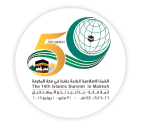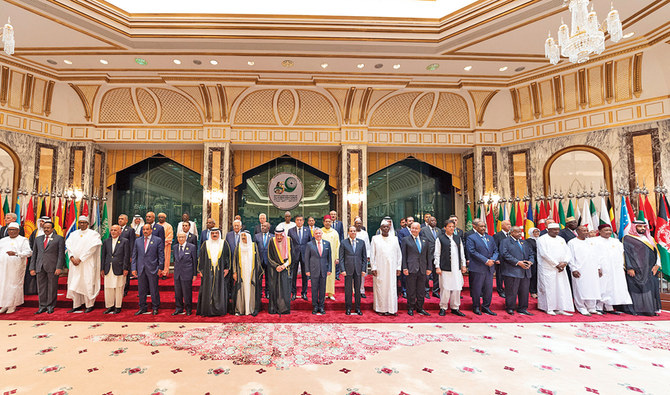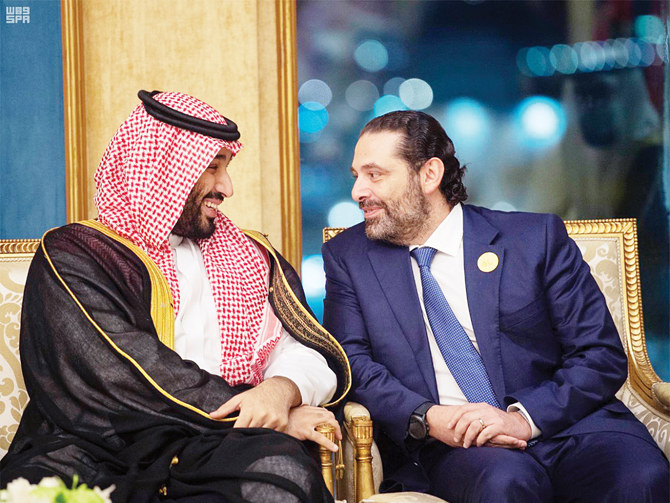MAKKAH: Extremism and terrorism are “the most serious scourge” facing the world, Saudi Arabia’s King Salman said on Friday at the 14th Islamic Summit, organized by the Organization of Islamic Cooperation (OIC) in Makkah.
The summit’s theme was “Hand in Hand Toward the Future,” and was chaired by the king, who received leaders and heads of Muslim-majority countries.
Saudi Crown Prince Mohammed bin Salman and Makkah Gov. Prince Khalid Al-Faisal also received the guests.
In his speech, King Salman thanked Turkish President Recep Tayyip Erdogan for his efforts as chairman of the previous summit.
The king also thanked OIC Secretary-General Yousef Al-Othaimeen for his efforts to promote Islamic cooperation.
“The Palestinian cause is the cornerstone of the OIC’s work, and is the focus of our attention until the brotherly Palestinian people get all their legitimate rights,” King Salman said.
Efforts must be made to combat extremism and terrorism, expose their supporters, and dry up their financial resources in all available ways, he added.
FASTFACT
• The OIC secretary-general has congratulated King Salman on assuming the presidency of the Islamic Summit.
• The OIC Summit denounced US moves to transfer its embassy to Jerusalem and recognize Israel’s sovereignty over the Golan Heights.
• The OIC called for a ‘boycott’ of countries that have opened diplomatic missions in the city.
• The OIC condemned the inhumane situation of Rohingya Muslims, urging a halt to violence.
“During this holy month (of Ramadan), commercial vessels, including two Saudi oil tankers, were subjected near the UAE’s territorial waters to terrorist sabotage. This poses a serious threat to the security and safety of maritime traffic, and to regional and international security,” he said.
“Also, two oil facilities in Saudi Arabia were attacked by drones launched by Iranian-backed terrorist militias … These subversive terrorist acts not only target the Kingdom and the Gulf region, but also the security of navigation and world energy supplies,” he added.
“It is painful that Muslims make up the highest proportion of displaced people and refugees worldwide due to unrest, wars, and a decline in safe living opportunities in their countries,” King Salman said.
“Emanating from this, Saudi Arabia has been seeking to reconcile different viewpoints to serve Islamic countries and their peoples, while continuing to provide assistance … through humanitarian and relief efforts in order to maintain the sovereignty, security and stability of Islamic countries.”

Restructuring, developing and reforming the OIC is crucial to address the challenges facing the Muslim world, the king added.
“Through its presidency of the summit, Saudi Arabia will endeavor to work with OIC member states and the OIC General Secretariat … to achieve (people’s) aspirations,” he said.
Saudi Minister of State for Foreign Affairs Adel Al-Jubeir said the Kingdom has always worked for the stability of all Arab and Muslim peoples.
“It always tries to build bridges of investments, commerce, empower women and youths. It continually does its best to create an environment where technology and innovation prevail, not only in Saudi Arabia but also everywhere in the Muslim world,” he added.
Al-Othaimeen said he received a cable message from Chinese President Xi Jinping that read: “The OIC represents a symbol of solidarity among Muslim countries, and it has been making important contributions to promote cooperation among its member states for 50 years, and that is really appreciated.”
The message added: “The Chinese side attaches great importance to its friendly relations with Muslim countries, and the OIC is an important bridge for cooperation between China and the Islamic world.”
The cable continued: “We are also keen to work with Muslim countries to promote mutual political trust, promote practical cooperation, intensify civilizational dialogue, open up wider horizons for friendly relations between China and the Islamic world, and contribute to build a society of common destiny for mankind.”
Al-Jubeir said the Islamic world is facing many challenges, but “there are even more opportunities to develop. The challenges are in extremism, terrorism, sectarianism and conflicts.”
It is painful that Muslims make up the highest proportion of displaced people and refugees worldwide due to unrest, wars and decline of safe living opportunities in their countries.
King Salman
The Islamic world has tremendous natural resources, he added. “The Muslim world makes up a third of the whole world, but unluckily there are some parties that work on hindering these opportunities and damaging the Muslim world’s capabilities,” he said.
“Some others spread sectarianism, while others do their utmost to support terrorism. Others provide terror militias with ballistic missiles and drones,” Al-Jubeir added.
“The country that does that all is Iran ... The GCC (Gulf Cooperation Council) states, Arab and Muslim countries will never accept such acts and behaviors,” he said.
“The whole Islamic world is now saying to Iran: Adopt policies that lead to respecting other people if you want to be respected,” he added.
“Supporting terror militias, bombing embassies, making clandestine terrorist cells, and smuggling weapons and explosives to other countries — these cannot be the behaviors of a country that wants to live peacefully and gain its neighbors’ respect,” he said, adding that Iran is the world’s top sponsor of terrorism.
The solution to the Israeli-Palestinian conflict “should be based on international resolutions, the Arab Peace Initiative, and the establishment of a Palestinian state along the 1967 borders with East Jerusalem as its capital,” Al-Jubeir said.
Jerry Maher, former CEO of Radio Sawt Beirut, told Arab News: “Arab and Muslim countries will review their policies and relations with Iran if it continues to escalate tensions in the region. Confrontation is possible.”
He said: “The message from the Arab and Muslim worlds to Iran is clear: That 1.5 billion Muslims stand behind Saudi Arabia and its leadership. They also reject these continuous threats and attacks against civilian areas (in the Kingdom).”
He added: “They (Tehran) didn’t expect the Arab and Muslim worlds to respond that quickly. Iran’s foreign minister and his deputy are visiting countries in the East and West in an attempt to find a solution, after they realized that something unexpected could happen.”
Saudi columnist Khalid Al-Sulaiman told Arab News that the Kingdom “is looking for active roles to be played by (Muslim) countries … to counter challenges in the region.”
He said: “Saudi Arabia has warned against Iranian expansionism, but that warning wasn’t taken seriously. Now Saudi Arabia is putting the Muslim world face to face with its responsibilities. Saudi Arabia today is the last line of defense for the Arab world.”



















